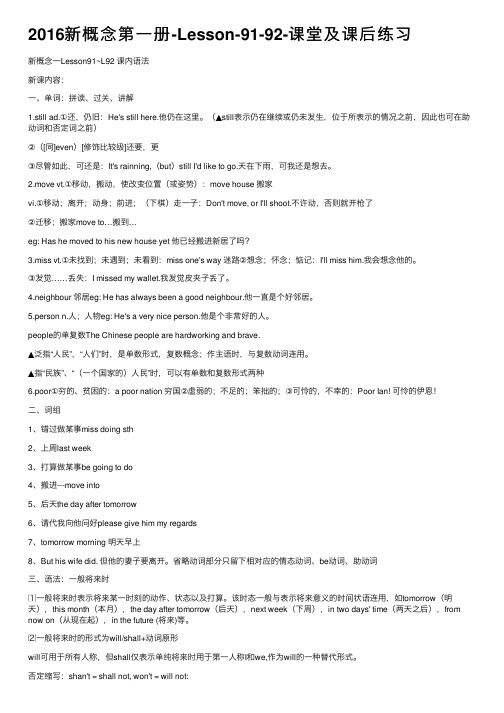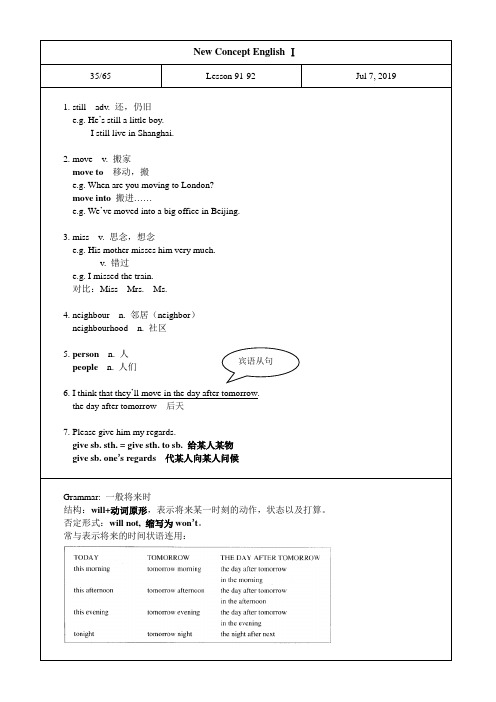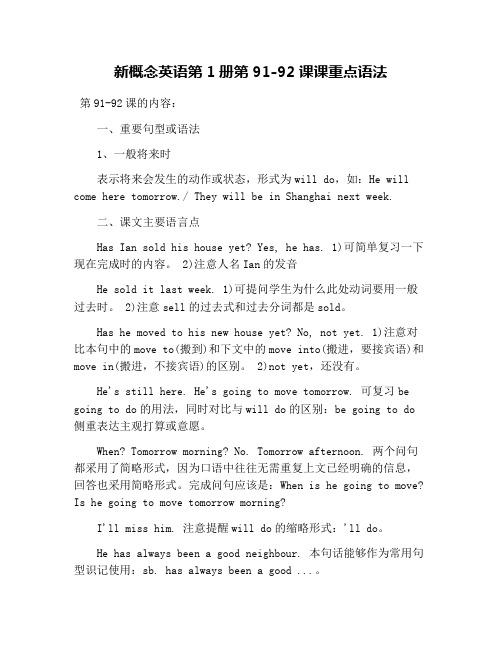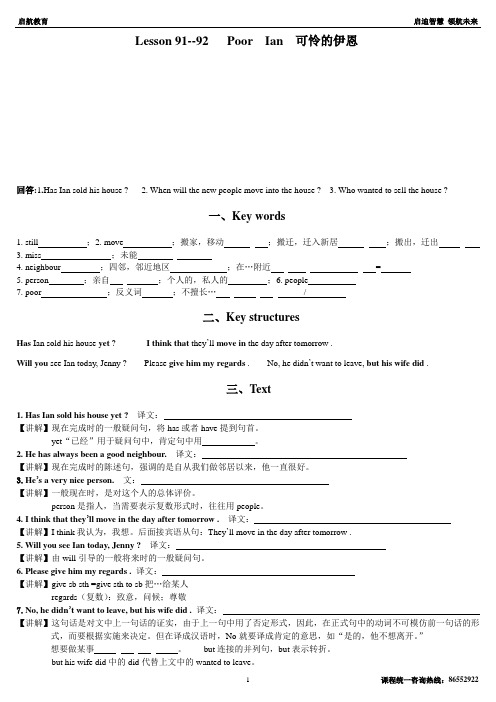新概念英语第一册lesson91-92分析
新概念英语第1册第91-92课课重点语法

新概念英语第1册第91-92课课重点语法第91-92课的内容:一、重要句型或语法1、一般将来时表示将来会发生的动作或状态,形式为will do,如:He will come here tomorrow./ They will be in Shanghai next week.二、课文主要语言点Has Ian sold his house yet? Yes, he has. 1)可简单复习一下现在完成时的内容。
2)注意人名Ian的发音He sold it last week. 1)可提问学生为什么此处动词要用一般过去时。
2)注意sell的过去式和过去分词都是sold。
Has he moved to his new house yet? No, not yet. 1)注意对比本句中的move to(搬到)和下文中的move into(搬进,要接宾语)和move in(搬进,不接宾语)的区别。
2)not yet,还没有。
He's still here. He's going to move tomorrow. 可复习be going to do的用法,同时对比与will do的区别:be going to do侧重表达主观打算或意愿。
When? Tomorrow morning? No. Tomorrow afternoon. 两个问句都采用了简略形式,因为口语中往往无需重复上文已经明确的信息,回答也采用简略形式。
完成问句应该是:When is he going to move? Is he going to move tomorrow morning?I'll miss him. 注意提醒will do的缩略形式:'ll do。
He has always been a good neighbour. 本句话可以作为常用句型识记运用:sb. has always been a good ...。
2016新概念第一册-Lesson-91-92-课堂及课后练习

2016新概念第⼀册-Lesson-91-92-课堂及课后练习新概念⼀Lesson91~L92 课内语法新课内容:⼀、单词:拼读、过关、讲解1.still ad.①还,仍旧:He's still here.他仍在这⾥。
(▲still表⽰仍在继续或仍未发⽣,位于所表⽰的情况之前,因此也可在助动词和否定词之前)②([同]even)[修饰⽐较级]还要,更③尽管如此,可还是:It's rainning,(but)still I'd like to go.天在下⾬,可我还是想去。
2.move vt.①移动,搬动,使改变位置(或姿势):move house 搬家vi.①移动;离开;动⾝;前进;(下棋)⾛⼀⼦:Don't move, or I'll shoot.不许动,否则就开枪了②迁移;搬家move to…搬到…eg: Has he moved to his new house yet 他已经搬进新居了吗?3.miss vt.①未找到;未遇到;未看到:miss one's way 迷路②想念;怀念;惦记:I'll miss him.我会想念他的。
③发觉……丢失:I missed my wallet.我发觉⽪夹⼦丢了。
4.neighbour 邻居eg: He has always been a good neighbour.他⼀直是个好邻居。
5.person n.⼈;⼈物eg: He's a very nice person.他是个⾮常好的⼈。
people的单复数The Chinese people are hardworking and brave.▲泛指“⼈民”,“⼈们”时,是单数形式,复数概念;作主语时,与复数动词连⽤。
▲指“民族”、“(⼀个国家的)⼈民”时,可以有单数和复数形式两种6.poor①穷的、贫困的:a poor nation 穷国②虚弱的;不⾜的;笨拙的;③可怜的,不幸的:Poor Ian! 可怜的伊恩!⼆、词组1、错过做某事miss doing sth2、上周last week3、打算做某事be going to do4、搬进---move into5、后天the day after tomorrow6、请代我向他问好please give him my regards7、tomorrow morning 明天早上8、But his wife did. 但他的妻⼦要离开。
Lesson 91-92课后小结

4.跟读录音复习单词,背诵L91课文,下周五前将视频发至班级群。
New Concept English Ⅰ
35/65
Lesson91-92
Jul 7, 2019
1. still adv.还,仍旧
e.g.He’s still a little boy.
I still live in Shanghai.
2.move v.搬家
move to移动,搬
e.g.When are you moving to Lnn.人
peoplen.人们
6.I thinkthat they’ll move in the day after tomorrow.
the day after tomorrow后天
7. Please give him my regards.
give sb.sth. = give sth. to sb.给某人某物
give sb. one’s regards代某人向某人问候
Grammar:一般将来时
结构:will+动词原形,表示将来某一时刻的动作,状态以及打算。
否定形式:will not,缩写为won’t。
常与表示将来的时间状语连用:
课后复习要求:
1. 抄写L91单词三英一中,默写单词和句子;
2.完成L91-92一课一练及课前测试;
move into搬进……
e.g.We’ve moved into a big officein Beijing.
3.miss v.思念,想念
e.g.His mother misses him very much.
v.错过
e.g.I missedthe train.
新概念英语第1册第91-92课课重点语法

新概念英语第1册第91-92课课重点语法第91-92课的内容:一、重要句型或语法1、一般将来时表示将来会发生的动作或状态,形式为will do,如:He will come here tomorrow./ They will be in Shanghai next week.二、课文主要语言点Has Ian sold his house yet? Yes, he has. 1)可简单复习一下现在完成时的内容。
2)注意人名Ian的发音He sold it last week. 1)可提问学生为什么此处动词要用一般过去时。
2)注意sell的过去式和过去分词都是sold。
Has he moved to his new house yet? No, not yet. 1)注意对比本句中的move to(搬到)和下文中的move into(搬进,要接宾语)和move in(搬进,不接宾语)的区别。
2)not yet,还没有。
He's still here. He's going to move tomorrow. 可复习be going to do的用法,同时对比与will do的区别:be going to do侧重表达主观打算或意愿。
When? Tomorrow morning? No. Tomorrow afternoon. 两个问句都采用了简略形式,因为口语中往往无需重复上文已经明确的信息,回答也采用简略形式。
完成问句应该是:When is he going to move? Is he going to move tomorrow morning?I'll miss him. 注意提醒will do的缩略形式:'ll do。
He has always been a good neighbour. 本句话能够作为常用句型识记使用:sb. has always been a good ...。
新概念第一册Lesson 91-92知识点及拓展

Lesson 91-92Poor Ian!CATHERING: Has Ian sold his house yet?JENNY: Yes, he has. He sold it last week.CATHERING: Has he moved to his new house yet?JENNY: No, not yet. He's still here. He's going to movetomorrow.CATHERING: When? Tomorrow morning?JENNY: No. Tomorrow afternoon. I'll miss him.He has always been a good neighbour.LIDA: He's a very nice person. We'll all miss him. CATHERING: When will the new people move into thishouse?JENNY: I think that they'll move in the day aftertomorrow.LINDA: Will you see Ian today, Jenny?JENNY: Yes, I will.LINDA: Please give him my regards.CATHERING: Poor Ian! He didn't want to leave this house.JENNY: No, he didn't want to leave, but his wife did!1. Has Ian sold his house yet?Has he moved to his new house yet?--yet 己经,还(疑问句,否定句)--already (肯定句)--My father has already come home form work.(already置于助动词与实义动词之间)--Has your father come home yet?(yet一般放在句末)--My father hasn't come home from work yet.2. He sold it last week.一般过去时,强调“上周”这个时间所发生“卖房”的这个动作。
新概念一Lesson91-92讲义doc

Lesson 91--92 Poor Ian 可怜的伊恩回答:1.Has Ian sold his house ? 2. When will the new people move into the house ? 3. Who wanted to sell the house ?一、Key words1. still ;2. move ;搬家,移动;搬迁,迁入新居;搬出,迁出3. miss ;未能4. neighbour ;四邻,邻近地区;在…附近=5. person ;亲自;个人的,私人的;6. people7. poor ;反义词;不擅长…/二、Key structuresHas Ian sold his house yet ?I think that they’ll move in the day after tomorrow .Will you see Ian today, Jenny ? Please give him my regards . No, he didn’t want to leave, but his wife did .三、Text1. Has Ian sold his house yet ?译文:【讲解】现在完成时的一般疑问句,将has或者have提到句首。
yet“已经”用于疑问句中,肯定句中用。
2. He has always been a good neighbour. 译文:【讲解】现在完成时的陈述句,强调的是自从我们做邻居以来,他一直很好。
3.He’s a very nice person. 文:【讲解】一般现在时,是对这个人的总体评价。
person是指人,当需要表示复数形式时,往往用people。
4. I think that they’ll move in the day after tomorrow . 译文:【讲解】I think我认为,我想。
后面接宾语从句:They’ll move in the day after tomorrow .5. Will you see Ian today, Jenny ? 译文:【讲解】由will引导的一般将来时的一般疑问句。
Lesson91-92(教案)-2023-2024学年新概念英语第一册
答案:Yes, I like traveling. Because it can broaden my horizons and enrich my life experience.
3.请用英语描述你最喜欢的季节,并说明原因。
答案:My favorite season is spring. Because it is warm and pleasant, and everything is full of vitality.
10.学习兴趣:学生通过学习英语,提高了学习兴趣和积极性,能够更加主动地投入到英语学习和实践中。
内容逻辑关系
①重点知识点:本节课的重点知识点包括英语日常表达和语法知识,如问候、介绍、询问等。
②词句:课程中将涉及一些基本的词汇和句型,如hello、how are you、my name is等。
③板书设计:
在教学方法上,我采用了讲授法、讨论法和案例研究法相结合的教学方法。通过这种方式,学生们能够更好地理解和掌握课程内容,同时也能够提高自己的思维能力和分析问题的能力。然而,在实际操作中,我发现学生们在小组讨论和合作学习上还存在一些问题。为了提高学生们的小组讨论和合作学习的效果,我需要在未来的课程中更加注重小组讨论和合作学习的指导和反馈。
5.教师评价:教师需要对学生的学习情况进行全面的评价,包括学生的学习态度、学习方法、学习效果等方面。教师需要给予学生积极的评价,鼓励学生继续努力,同时也需要指出学生的不足之处,帮助学生改进。
九、作业评价
1.认真批改:教师需要认真批改学生的作业,检查学生对课程内容的掌握程度。
2.点评:教师需要对学生的作业进行点评,给予学生积极的反馈。
(4)讨论:组织学生进行小组讨论,让他们就某个话题进行交流和分享,提高他们的思维能力和分析问题的能力。
新概念课堂笔记第一册Lesson91-92
新概念英语课堂笔记第一册Lesson 91-92Word Studystill【用法】adv. 还,仍旧;还要,甚至更;静止地adj. 静止的,不动的;寂静的【例句】I still don’t understand what he meant. 我还是不明白他是什么意思。
She was still beautiful at the age of 46. 她46岁时依然美丽。
It was hot yesterday, but it’s still hotter today. 昨天很热,然而今天甚至还要热些。
She looked very ill last week and this week looks still worse. 上星期她看上去病的很厉害,而这个星期看来更不行了。
He is sitting still. 他一动不动地坐着。
The patient is lying still. 病人安静地躺着。
The doctor asked me to keep still. 医生叫我不要动。
How still everything is! 一切是多么寂静啊!The night was very still. 那天晚上很宁静。
move【用法】v. 搬家;搬动,移动;使感动【词组】move to 搬到……move sth. away 搬开;移走move on 朝前走;继续移动move about 走来走去move in 迁入move out 迁出【扩展】movement n. 移动;搬动;运动;活动movable adj. 可移动的moved adj. 感动的moving adj. 令人感动的,感人的【例句】The Smiths are going to move to New York. 史密斯一家打算搬到纽约去。
They moved into the new house last month. 他们上个月搬进了新家。
新概念英语1 Lesson91-92
Lesson 91 Poor Ian! & Lesson 92 When will …?一、教学重点1、时态:一般将来时态。
2、句型:-What will you do tomorrow? -I’ll do... tomorrow.-When will you do...? -I’ll do it tomorrow.-Will you do...tomorrow? -Yes, I will. / No, I won’t.二单词详解★still adv. 还,仍旧①adv. 还是,仍然I still don’t understand what’s wrong with him.②adj&adv. 静止;安静keep still保持静止He is sitting still. 他一动不动地坐着。
★move感动: The story moves me.搬家: move to 搬到…地方move in 搬进move out 搬出来move away 搬走★miss v. 想念,思念① v. 想念,惦念I miss you very much.② v. 错过;未做到He overslept and missed his train.★neighbour 邻居Your neighbour is someone who lives near you★person n. 人(强调个体,不分男女老少,有复数persons)He is a nice/good person. 他是个好人。
in person 亲自,直接的He will go to get the money in person. 他将亲自去取钱。
personal adj. 个人的,私人的 a personal letter★people n. 人们(强调集体,是集合名词)ten people 十个人(集体名词,不加S,用复数)Chinese people 中华儿女Let's drink to the friendship of our two peoples. (指两国人民/民族,用复数形式)★ poor adj.①可怜的Poor boy!②贫穷的the poor -- the rich③笨拙的,差劲的be good/poor at sth. 擅长/不擅长三、精讲课文★ -Has he moved to his new house yet?(疑问句尾)move to 搬到…-No, not yet. = No, he has not moved to his new house yet.(否定句尾)★He’s still here. = He is still here. 副词still也可用于一般现在时,注意位置在be 动词之后。
新概念英语第一册91-92课课件(共31张PPT)
He didn’t go to school, did he?
No, I’m not.
他没有去上学,是吗?
You aren’t a student, are you?
No, he didn’t.
Yes, I am.
是的, 他没去。
(不,我是一个学生。)
Yes, he did.
No, I’m not.
have a talk (with sb)=talk (with sb) 谈话(正式)
3.theatre
n. 剧场 戏院 go to the theatre
go to the movies
go to the cinema 去看电影
4.seat
n. 座位 have a seat =take a seat =sit down 就座
CATHERINE:Poor Ian! He didn't want to leave this house.
JENNY
反义疑问句
:No, he didn't want to leave, but his wife did!
You’re a student, aren’t you?
Yes, I am.
private letter 私人信件
private car 私家车
private life 私生活
public adj. 公共的 in private=privately privacy n 隐私
2.conversation
n.谈话(非正式) have a coversation (with sb ) 对话或对白
未能
I missed buying the magazine. 我未能买到那本杂志。
- 1、下载文档前请自行甄别文档内容的完整性,平台不提供额外的编辑、内容补充、找答案等附加服务。
- 2、"仅部分预览"的文档,不可在线预览部分如存在完整性等问题,可反馈申请退款(可完整预览的文档不适用该条件!)。
- 3、如文档侵犯您的权益,请联系客服反馈,我们会尽快为您处理(人工客服工作时间:9:00-18:30)。
Poor Ian
• still • move • miss • neighbour • person • people • poor
adv. 还,仍旧 v. 搬家 v. 想念,思念 n. 邻居 n. 人 n. 人们 adj. 可怜的
• still adv. 还,仍旧 • ① adv. 还是,仍然 • 我仍然不知道他是什么意思。
• -No, not yet. • Move to 搬到… • 我明天要搬到B区的办公室。
• I'll move to the office in zone B tomorrow.
• Yet用于疑问句和否定句的句尾。
• No, he has not moved to his new house yet.
• We'll move to the country next month.
• miss • ① v. 想念,惦念 • 我想你 • I missed you.
• I'll miss him. = I will miss him • I miss home very much. • I miss you because I missed you.
shall,Will的用法
• 在表达将来要发生的事情时,通常要用到 shall和will, shall一般与第一人称连用,will 一般与第二和第三人称连用,但是现在已 经很少用到shall了,大家都被美语同化了, 不论人称都用will。
• I will go to school tomorrow. • My husband and I will both miss him. 当人数
• 公园里有很多人。
• There're a lot of people in the park.
• Please give him my regards. • give sb. sth. = give sth. to sb. 给某人某
物=把某物给某人 • 请代我们问候你的父母
• Please give your parents our regards.
② v. 错过;未做到 • 他睡过了头,错过了他那班火车。
• He overslept and missed his train. • 我错过了一个可能实现自己梦想的机会。
• I missed an opportunity of realizing my dream.
课文讲解
• -Has he moved to his new house yet?
超过一人时,will后面要加both, 表示都是。
一般将来时
• What will… he'll / she'll / it'll/ he'll • When will… • What will you do tomorrow? • When will you leave? • 你后天打算去学校干嘛啊? • 你什么时候出发? • 注意在翻译时要与表示将来的时间状语连
• I still don't understand what he meant. • ② adv. 还要,甚至更 • 她上周看起来病得很严重,这周更严重了。
• She looked very ill last week and this week looks still worse.
• ③ adv. 静止地;安静地
• Please give our regards to your parents. • Poor Ian! 同情某人时的常用语。
• -He didn't want to leave this house. • -No, he didn't, but his wife did! • 第二个句子是对第一个句子的证实,这里
• He is sitting still. • 他一动不动地坐着。 • 病人安静地躺着。
• The patient is lying still.
• move v. 搬家;感动 • 这个故事感动了我。
• This story moves me. • move to 搬到……地方 • move in 搬进 • move out 搬出来 • move away 搬走 • 我们下个月将搬到乡下
• He's going to move tomorrow. • be going to do 计划、打算做某事。
• He has always been a good neighbour. • 现在完成时 • 指Ian自从在这住开始到现在一直都很
好
• He's a very nice person. • 表达人的人品很好可以用good或nice。 • person 强调的个体的人,可以有复数
不可以按照中文习惯去赞同别人的说法, 而是要根据事实来说,因此回答no, he didn't want to leave. 但是翻译成中文的时候 要说,是的,他不愿意离开。
• eg: He didn't go to school last week, did he?
•
No, he didn't. 是的,他没去。
•
Yes, he did. 不,他去了的。
Hale Waihona Puke • 注意没有混搭形式:Yes, he didn't. / No, he
did.
一般将来时
• 一般将来时表示将来某一时刻的动作或状 态,或将来某一段时间内经常的动作或状 态。常常和表示将来的时间状语连用。如: tomorrow(明天), next week(下周), from now on(从现在开始);in the future (将来)等。 一般将来时由助动词shall (第一人称),will(第二、三人称) 动词 原形构成。美国英语则不管什么人称,一 律用will。
形式persons • people 通常是人的统称。
• When will the new people move into this house?
•
move to = move into 搬进
• people = neighbours
• 她是这个职位的合适人选。
• She's the right person for this job.
